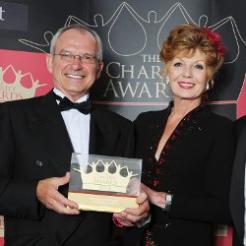Tom Flood CBE, who will step down as CEO of conservation charity BTCV in July, provides some words of encouragement for a charity sector facing increasingly challenging times.
This is a uniquely important moment in the history of charities.
In 1986, I left a career in the private sector and joined an environmental charity based in Oxfordshire, known then as the British Trust for Conservation Volunteers. After 25 years with BTCV I recently announced my decision to step down. I have been reflecting on how the role of charities has been shaped over these decades, and what steps are we likely to have to consider in the future to remain fit for purpose.
Back in 1986 I joined a small NGO, which was passionate about people improving the local environment, volunteers were critical to the day-to-day running of the organisation and staff were seen as an expense. Its appeal was the hedgerow it restored, the dry stone walls it repaired and the great camaraderie amongst the volunteer groups. Interestingly the challenge of fundraising was as acute then as it is now, and its dependence on statutory funding similar to that of many NGOs.
Today BTCV has grown sixfold to an income of £40m, with 650 staff and delivering projects in the four countries of the UK as well as overseas. Overnight, however, with the reduction in public spending, and 60 per cent of its income coming from government, there is an urgent need to review its core purpose, funding base and strategic planning for the future resilience of this social enterprise group.
So how is the challenge being addressed? Let’s face it, 2011 was a difficult year and the signs for 2012 are not encouraging. My own view is that we face up to ten years of austerity and for most NGOs grants will end, and a contract culture will dominate the market.
'Now is a time for innovation'
As unemployment rises, and demand for services increases, leaders in the sector will be tested like never before. Strong governance will be critical. A key issue will be whether there are enough trustees available, with the right skills, willing to take on what is increasingly an onerous and responsible position.
Now is the time for us to demonstrate innovation, resolution, commitment and passion for our cause. Let’s not allow ourselves to become victims of this downturn, but take this as a one-off opportunity to build an investment case for business continuity.
As chair of Acevo Solutions, I am delighted that its next product development is to pilot, in partnership with the Local Government Association, an online support package for consortia between charities and local government. Pioneering developments like this will give national charities and local charities a platform to share a service provision, and act as a counterweight and entrenched public and private sector interests.
2012 should be a year for the nation to celebrate with both the Olympics and the Diamond Jubilee taking place. Many charities have links with and are supported by the Royal family. How can we use this unique moment in the history of the nation to unlock community pride, bring people together for a shared purpose and rekindle in the public consciousness the central role of charities in our daily lives?
All charities, particularly those who have a significant funding relationship with government, will find they have an urgent need to engage their board and staff on ensuring they have a compelling and well understood brand, a clarity about their unique role and an organisation which demonstrate daily its values and commitment to beneficiaries. Your brand as an organisation is critical to success and gaining public recognition and support for your cause. It is a core task for any CEO. It is not just about logos and designs; it’s much more than that. What does your name convey about what you do? Are your values, culture and unique offer visible and self-evident? Do you convey professionalism, impact, innovation and value for money? If not, this is an immediate urgent task for the senior management of any charity in these challenging times.
So, ensuring there is clarity of narrative and an evidence-based business case are now critical to a CEO leadership and partnership with the board, staff and stakeholders. In a rapidly changing world, with new social media changing how individuals and communities receive information and communicate, charities need to embrace this future with vigour and creativity to sustain their own future and deliver transformational society solutions.









